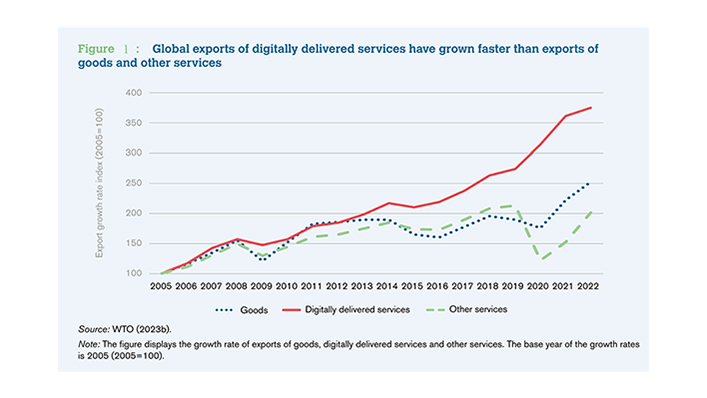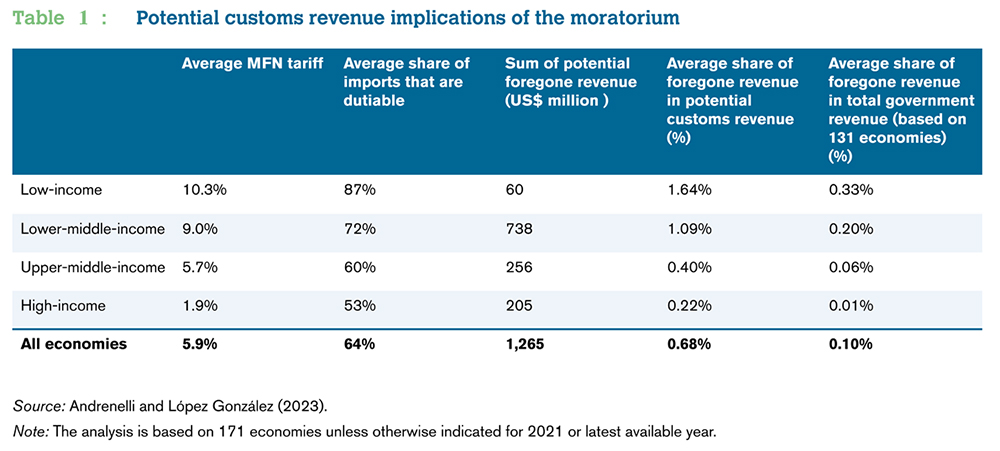The transformative effects of digital trade on developing economies are explored in a report just published by the WTO in cooperation with the International Monetary Fund (IMF), the Organisation for Economic Co-operation and Development (OECD), the United Nations Conference on Trade and Development (UNCTAD) and the World Bank. “Digital Trade for Development” also emphasizes the pivotal role of international cooperation in helping developing economies seize the opportunities of digital trade and tackle the related challenges.
Digitally delivered services have experienced rapid growth
Digital trade, encompassing all trade that is digitally ordered and/or delivered, is radically changing the global economy.
One of the most striking trends in this digital era is the rapid growth of digitally delivered services, which have experienced a nearly fourfold increase in value since 2005, significantly outpacing the growth of goods and other services exports (see Figure 1).
In 2022, digitally delivered services accounted for 54 per cent of total services exports. This surge is creating new opportunities for various players in the global market, including micro, small and medium-sized enterprises (MSMEs).
While developed economies are the main exporters of digitally delivered services, developing economies, including in Africa, are increasingly exporting such services. That said, least-developed countries (LDCs) continue to experience slower growth in digitally delivered services exports.

Digital infrastructure and skills are essential for digital trade
Access to fast, affordable and reliable digital infrastructure as well as access to training in the skills necessary to utilize digital technologies are pivotal to enable economies to engage in and benefit from digital trade.
Significant progress has been made in increasing access to the internet, with about 67 per cent of the world’s population – totalling approximately 5.4 billion people — currently having internet access. However, one-third of the global population, primarily in low-income and lower-middle-income economies, still remains offline.
Trade policy can contribute to building a more rapid, cost-effective and dynamic digital infrastructure. This can be achieved, for instance, by addressing high tariffs on imports of information and communications technology (ICT) equipment, restrictive import policies and limited competition in telecommunications services.
An enabling regulatory environment is key for facilitating digital trade
Governments play a critical role in ensuring that the regulatory and policy environment for digital trade is predictable and interoperable, and in contributing to the development of digital infrastructure and skills.
Governments can contribute, for example, to facilitating remote transactions, enhancing trust in digital markets, promoting affordable internet access and establishing a balanced approach to data flow regulation. Appropriate safeguards for digital trade also need to be provided by ensuring data privacy, consumer protection and cybersecurity.
Recent WTO analysis finds that when a strong regulatory environment for digitally delivered services is put in place, the reduction in trade costs due to the effect of improved digital connectivity more than doubles in middle- and low-income economies.
Bridging the digital divide is an imperative to foster digital trade
If economies are to harness the full benefits of digital trade, it is not only domestic efforts that are essential but also international cooperation.
International financial and technical support are necessary to build capacity in developing economies so that they can improve connectivity and skills and regulate areas relevant to digital trade. Initiatives such as the WTO-led Aid for Trade, the UNCTAD-led eTrade for all and the World Bank-led Digital Advisory and Trade Assistance (DATA) Fund are significant steps in this direction.
It is also essential to improve data collection as the availability of official statistics on digital trade is currently limited. The WTO is contributing to this effort, most recently through the launch of a new dataset on digitally delivered services.
Digital trade governance is expanding
The governance of digital trade-related issues has seen progress primarily through bilateral and regional trade agreements. By the end of 2022, 116 such agreements included digital trade provisions. As yet, few LDCs are party to these agreements.
In addition, discussions on digital trade are taking place in the WTO, including under the Work Programme on E-Commerce. Also, 90 WTO members, including many developing economies, are working under the Joint Statement Initiative on E-commerce to negotiate specific rules on digital trade-related issues.
WTO moratorium on customs duties and its revenue implications
The WTO moratorium on the imposition of customs duties on electronic transmissions, in place since 1998, is currently a focal point of discussion at the WTO.
The moratorium is the only WTO provision explicitly applying to e-commerce. In June 2022, WTO members agreed to extend it “until the 13th WTO Ministerial Conference or 31 March 2024”.
However, there are divergent views on renewing the moratorium. Some members have expressed concerns that there is a lack of clarity regarding the scope and definition of the moratorium. There are also concerns about the opportunity costs of the moratorium, which include potential foregone customs revenue and the desire of individual economies to maintain a policy space amid rapid technological changes.
The impact of the moratorium on government revenue is estimated to be, on average, less than 0.33 per cent of overall government revenue in developing economies (see Table 1), with higher estimates for a handful of economies.
In addition, although tariffs and value-added tax (VAT) are not mutually exclusive, non-discriminatory domestic taxes like VAT are a less trade-distortive way to collect revenue from digital trade than tariffs or customs duties. Recent studies suggest that, if there were appropriate investment in tax administration capacities, VAT from taxing electronic transmissions could generate higher revenue for governments than customs duties at current rates.
Imposing customs duties on electronic transmissions would ultimately reduce digital trade. It would therefore also reduce its benefits, particularly for those who stand to gain the most from digital trade, such as MSMEs and firms owned by women.

The regulatory ecosystem for digital trade includes data flows, competition and consumer protection
Aside from trade rules, regulatory issues such as cross-border data flows, competition and consumer protection require global solutions. A balanced approach to global data governance is needed to ensure that data flows across borders as freely as possible and that public policy concerns are addressed.
Effective regulation of digital markets to manage anti-competitive behaviours and market power is crucial. To build trust in the digital economy, adequate legal frameworks for consumer protection and for addressing cross-border digital trade disputes must also be established.
Ensuring that the benefits of digital trade are inclusive is essential
International cooperation is critical to ensure the inclusive benefits of digital trade. Global efforts are needed to ensure that MSMEs, women, young entrepreneurs and consumers in all economies can reap the benefits of digital trade.
It is necessary to address infrastructural gaps, enhance skills and create enabling policies to ensure that the benefits of digital trade are inclusive. To achieve this, a whole-of-government approach is needed along with strong cooperation among international organizations, governments and stakeholders.
Reach us to explore global export and import deals